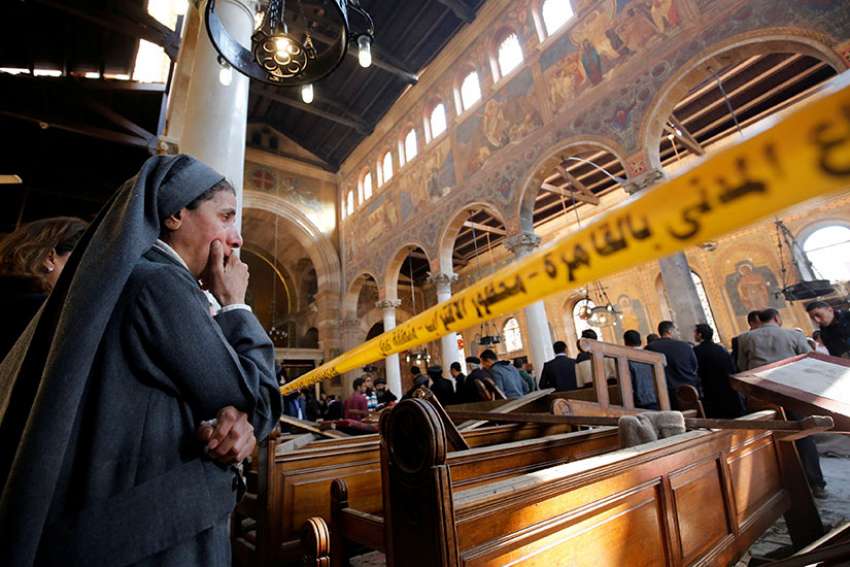Egypt’s Christians have been loyal, peaceful, and forgiving amid a recent spate of violence that has driven hundreds from their homes, Bishop Anba Angaelos, general bishop of the Coptic Orthodox Church in the U.K., told CNA in an interview.
“I take a huge pride in their witness and in their example,” he said.
“And I think that really has given a substantial example for all of us to follow. If they can live with this grace and graciousness in that volatile setting, then in our day-to-day lives and in our day-to-day struggles, we should be able to do the same.”
In the last three months around 40 Egyptian Christians have been killed, including in a bombing of St. Mark’s Coptic Orthodox Cathedral in Cairo in December that killed 29.
Local Islamic State affiliates in Egypt’s Sinai region have been targeting Christians, intending to drive them out of the area. Attacks in al-Arish, a city in the Sinai region, have resulted in seven deaths, with hundreds of Christians leaving their homes.
Their needs are “provided for,” Bishop Angaelos said, from his conversations with local Coptic bishops, and the government is working to provide education for the children.
“Of course they want to go back,” he said of Sinai’s Christians. “No one ever wants to leave their home. Leaving one’s home is traumatic, and especially when this isn’t just leaving. They’ve left sometimes with the very bare necessities, to have left their whole lives behind.”
Yet, he added, “they won’t go back unless the problem has been resolved.” The perpetrators of the attacks are still in the region and could strike again.
Life in Egypt is not easy for its Coptic Christians, who trace their roots as a community to St. Mark, who first evangelized the area. Christians make up 15 percent of the Egypt’s population.
Yet in many ways, especially in the country’s rural areas, they are treated as second-class citizens as they are victims of discrimination or even violence, and their churches have been attacked. Yet the crimes have not been properly investigated and punished by local authorities.
Christians have seen “many positive things” in the national government of President Abdel Fattah el-Sisi, Bishop Angaelos noted, but “what we’re not seeing done is a robust system of law and order at the local level” where security forces can curtail criminal acts and then the local judiciary can hold the perpetrators accountable.
“Because otherwise what happens is an overwhelming sense of impunity, and a criminal confidence that continues escalating the violence and the attacks,” he said.
Yet the international community must also be aware of the importance of promoting peace in the country so Christians can remain in their homes, he insisted.
“The tragedy is that the number of Christians in the Middle East has dwindled,” Bishop Angaelos said, “because every other country where there was a significant Christian presence has been devastated by war or conflict and they have moved.”
He estimated Egypt’s Christian minority to make up around 80 percent of the overall Middle Eastern Christian population.
What can be done to help the embattled Coptic Christians?
“First and foremost prayer,” the bishop explained. However, advocacy is also vital in a time when ongoing conflicts can be supplanted in the news cycle by even more terrible and explosive tragedies.
“Just because it’s not the top item in your newsfeed doesn’t mean it’s [not] still happening,” he maintained.
It is important “to keep the issue alive and to keep it in peoples’ minds and in peoples’ hearts, and to keep people aware that it continues to be a struggle,” he said, “because they do feel very voiceless, and they sometimes feel very unsupported. And it’s up to us, I think, to make sure that they don’t feel that.”
The U.S. must also pressure Egypt to ensure that Christians enjoy equal rights as the rest of the citizenry, he said.
International partners could accomplish a great deal of good through foreign investment and supporting tourism in the country, he explained. What is most needed is “not handouts,” he insisted, “but an investment in the country and in the people of the country.”
“This isn’t just about governments. This is about individuals feeling vulnerable economically, and so therefore the weaker elements also become vulnerable to radicalization,” he said.
The poor and the unemployed are more vulnerable to radicalization, he explained. “And we find that it is poor, unassuming people who are manipulated into these situations and unable to push back enough, unable to withstand the pressure. And they become prey.”
“What we see in the Christian community, of course, is that they suffer. The Christian communities suffer because those who work in private industry or in tourist industry are suffering.”


